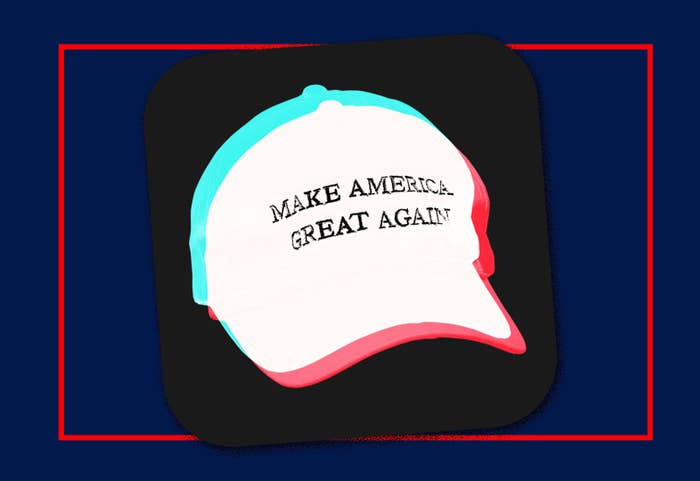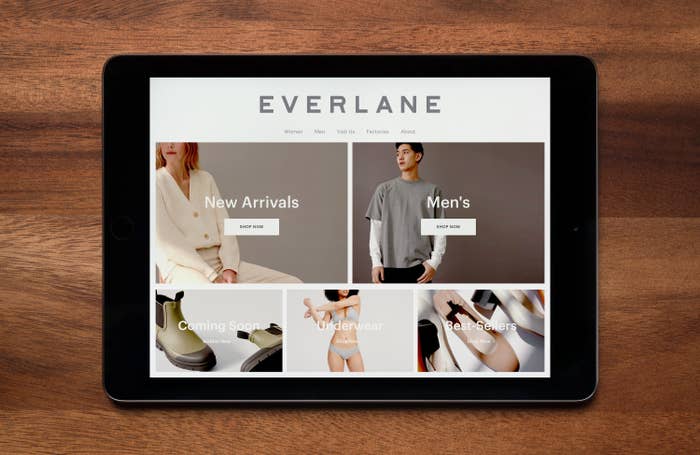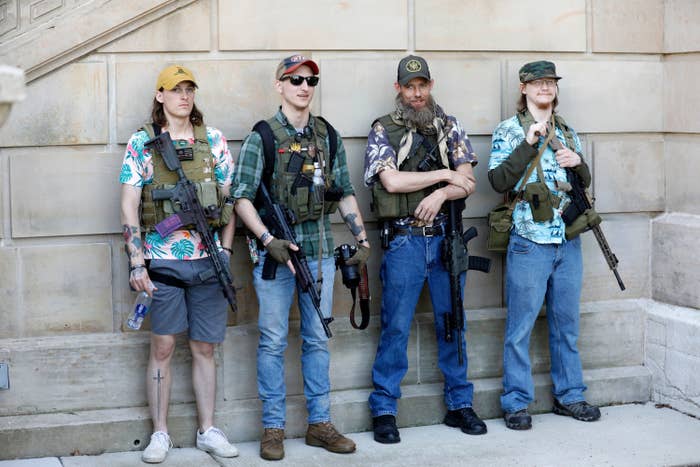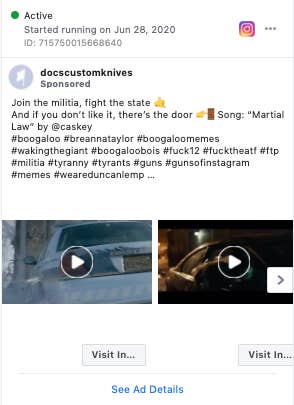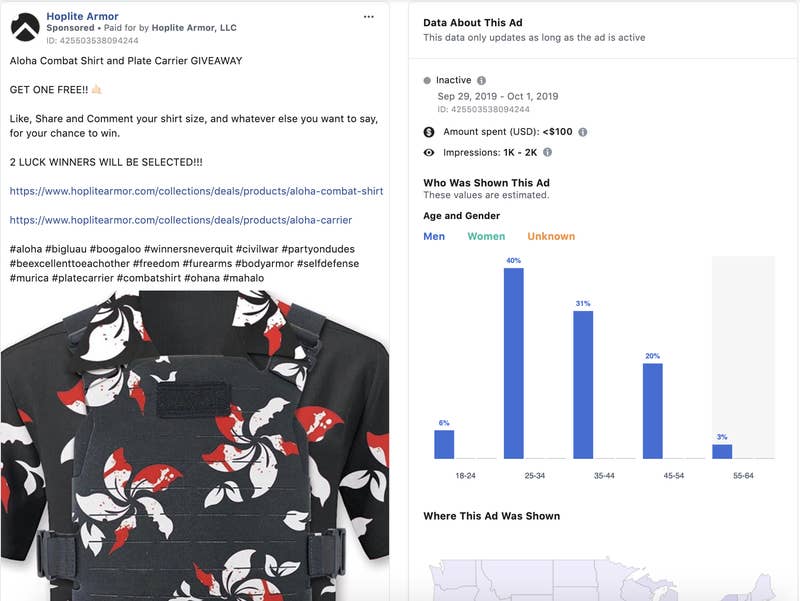Conservative Teens On TikTok Are Going Through Some Growing Pains
TikTok has given pro-Trump teens a platform to make memes — and get attention. But what happens when the news isn't funny anymore?
BuzzFeed News; Alamy
At first glance, Elicia Drew’s TikTok account looks like standard teenage girl fare. The 18-year-old is tall with straight brown hair, and she often dots the inside corners of her eyes with a frosted shadow. Unsurprisingly, she’s popular on the app, with 64,000 followers and 1.4 million likes. About half of her TikToks are of her dancing and lip-synching, as is now customary for the platform. In one popular video, she does the “Cannibal” dance; in another, she and a friend do the ZaeHD and CEO “Cookie Shop” dance challenge together — pretty benign, uncontroversial content. But then there are her other videos.
In a TikTok from February, Drew wraps herself in a giant Trump 2020 flag, lip-synching the president’s words: “If you hate our country, if you’re not happy here, you can leave.” In another, also from February, she mouths the title lyrics to Lizzo’s “Exactly How I Feel” as she points to the text overlaid on the video: “2 genders,” “any race can be racist,” “stop antagonizing straight white men.” (I do not know how Lizzo would feel about her music appearing in this video, but I have a few guesses.)
Amid the dance routines and the Vine-indebted comedy on TikTok are a sizable number of conservative TikToks made by teens like Drew. In this TikTok universe, teens confess their love for Donald Trump, post dance videos about how “abortion is murder,” and compare injecting cows with hormones to gender-affirming hormone therapy. Tagged with hashtags like #MAGA or #Trump2020, these videos are both outreach tools and entertainment. They use the popular memes of the moment to make a case for electing Trump to a second term and to generally remind (or convince) liberals of their own shortsighted stupidity.
In this TikTok universe, teens post dance videos about how “abortion is murder.”
“In terms of youth political expression, while there’s a dynamic and influential liberal activist community on TikTok, there’s actually plenty of conservative political expression, and pro-Trump voices definitely find an audience on the platform,” Ioana Literat, assistant professor of communication and media at Columbia University, told the New York Times this week. There are enough of these conservative TikTok teens to sustain more than a few group chats — some on Instagram, others on Snapchat. One is called “Super Secret Conservative Groupchat,” where members discuss current events, the greatness of the president, and who else on TikTok they might want to invite into their chat. They also discuss people like me. Back in February, when I initially DM’d and emailed interview requests to a few of the group chat’s members, they talked it out among themselves first.
“I sent this to the group chat and they were like, ‘Lance, I don’t know if you should do it,’” Lance Johnston, an 18-year-old high school senior living in Sherman, Texas, who now has more than 106,000 TikTok followers, told me in a phone interview in February. He seemed OK making an exception, saying, “I trust you. I think you'll be fine.”
In addition to these chats, there’s the Republican Hype House, a group account maintained by and featuring a collective of conservative TikTok users, similar to the Hype House that hosts semi-famous TikTok stars like Charli D’Amelio and Addison Rae. The Republican Hype House doesn’t have a corresponding physical location, unlike its namesake — but it certainly is influential, with nearly 700,000 followers.
Nick Lowenberg, a 17-year-old who goes by @nickvideos on TikTok, was one of the founding members of the Republican Hype House, though he’s no longer affiliated. His own account has just more than 333,000 followers (a number that has dipped quite a bit in the last few weeks), and more than 16 million likes. In late 2019 and for the first few months of 2020, he regularly posted videos of himself mugging for the camera, mocking liberals, and showing off his bedroom adorned with Trump memorabilia. Lowenberg spent most of his final year of high school spreading the Trump gospel.
But since late May, Lowenberg has had a significant change of heart. This month, he posted multiple videos about how he no longer supports Trump and “will no longer be making political content on [his] TikTok”; many of his old videos have been deleted. “He’s just an idiot,” he said about Trump in a TikTok last week. “Guys. Come on. Trump just ain’t it.”
He has criticized Trump’s business acumen, his divisive rhetoric, and called conservatives “hypocrites” (while also reassuring his viewers he is not a Democrat). It’s a significant reversal, especially for a teen who is one of the most-followed Republican boosters on TikTok, who once referred to himself in his account bio as the “CEO of Politics.”
“The political community on TikTok is just so toxic,” Lowenberg told me last week. “I want to get away from that.”
The first interviews for this story were done in a very different version of the world — before Joe Biden effectively won the Democratic primary, before the coronavirus pandemic devastated the US, and before Black Lives Matter protests made a powerful resurgence around the country and throughout the world. In that time, a few of the pro-Trump teens I spoke to, like Lowenberg, have also taken a step back from posting political content on TikTok altogether.
It’s hard to give wry political commentary on news that is fundamentally depressing. And perhaps it’s harder than it was a few months ago to score points and make cool friends online by supporting a president who seems unconcerned by the deaths of Black people in police custody, or the more than 127,000 Americans who have died of COVID-19. So we don’t necessarily know how much any teenager’s cooling enthusiasm for making pro-Trump, own-the-libs TikToks reflects a true shift in their opinions as much as it is demonstrative of a confused young person reacting to an audience who suddenly isn’t laughing at their jokes.
As Johnston told me when I spoke to him in February, “Who’s gonna wanna be on your side if you’re not having fun?”
The last few years have seemingly been a watershed moment for young people becoming politically involved — or rather, young people have effectively harnessed the internet to amplify their voices and ideas, and forced old people to recognize how politically aware and active they really are. Teenagers of every generation have always been political in their own ways. But maybe what is unique about this moment is that, in addition to protesting in old-fashioned ways, a large number of them are using memes and thirst videos to get their messages to the masses.
Before the last few months of global turmoil, TikTok wasn’t known for its political discourse, at least not in the way that Twitter or Facebook are. TikTok is, in many ways, an expected response to the death of Vine: It features funny, short, digestible videos, where the medium is also the message. But the Black Lives Matter protests and COVID-19 have given ample material to Gen Z kids on TikTok, often to criticize Republicans. Teenagers on TikTok post about how capitalism is inherently broken, ICE, Elijah McClain, and their ideological opposition to Trump.
“Who’s gonna wanna be on your side if you’re not having fun?”
But while teens like Greta Thunberg and Emma González are asking for radical change in how we tackle things like climate change and gun control, Lance Johnston and Elicia Drew think the status quo is just fine. The conservative TikTok teens I talked to first joined the app to follow their friends. Johnston made a TikTok about being Christian that went semi-viral, which prompted him to make more political content. (That said, he hasn’t made a staunchly conservative TikTok since June 11.)
“You see a lot of people say, ‘Oh, don’t bring politics to TikTok,’” Drew told me in February. “But what apps are most young, impressionable people on nowadays? Where is the biggest platform to reach out to especially younger people, but I mean, people of all ages? And it’s TikTok.”
Most of these teens range from 15 to 18, and the November 2020 election will be the first election they’re old enough to pay close attention to, and perhaps even participate in. The teens of pro-Trump TikTok are absolutely pumped to cast their first ballot, and they’re working hard to convince their online peers to be more politically engaged. “Most of the people at my school don’t know anything about politics,” said Johnston. “I think by me doing this on TikTok, it’s really opening their eyes to see Oh, politics looks kind of fun; politics can be cool. I want them to think for themselves, but if I can influence and say, ‘Here’s my side of things,’ that’s what we’re really trying to do on TikTok.”
Kiah King, an 18-year-old high school senior living in Michigan, originally had an account on Musical.ly, the lip-synching app that later became TikTok. “I started getting a lot of political videos into my feed and so I was like, I support Trump and I'm not afraid to show it, so why not post about it?” King told me in February. “And all of a sudden I'm just, like, going through my phone, and it's just blowing up out of nowhere and I was like, holy crap, maybe I could make something out of this.”
These teens’ political beliefs are pretty typical of modern Republicans. Most of them claim to be just fine with marriage for same-sex couples, but their own statements and videos express a clear anxiety about trans people. “I don’t personally feel safe with a transgender using the women’s bathroom,” King told me in February. “There are creepy men out there who will dress up as women and go into bathrooms. This world has changed so much.”
These teens are determined to show that being a hard-right Republican isn’t just for boomers.
Many of them say they believe in an unregulated economy and think healthcare for all is an expensive, unrealistic, socialist program that will bankrupt the country. They are generally against abortion. They think (or in some cases, used to think) Trump is the greatest president to ever be elected in the United States of America. They don’t like open borders. What they’re saying isn’t much different from what you might hear on Fox News. But the kids on TikTok are less fire and brimstone and more good lighting and clever editing, a smart way to repackage beliefs that have been cornerstones of the Republican ideology for decades.
These teens are determined to show that being a hard-right Republican isn’t just for boomers. “I think there’s a whole, like, you know, ‘Let’s let the boomers die off because they’re all conservative,’” Drew said in February. “It’s just surprising that a party that people think is dying off is still strong and alive today.”
It makes sense that conservative Gen Z teens, who have grown up online with dark humor, would love Trump — a president whom history, at best, might remember as a mudslinger who said whatever he wanted. (At worst, he will be remembered as a racist, a sexist, and an alleged abuser.) Though he’s 74, Trump has a way of communicating that is perfectly suited to the contemporary internet — full of owns and trolling.
“Trump makes it fun,” Johnston said. “He’s like America’s dad. He doesn’t care what anyone says, and he roasts people. Trump is the only one who really posts memes and goes at it from that angle, and a lot of people love that because they're like, ‘Trump's a savage. He's hilarious. I love him.’”
The tone in these teens’ TikToks often resonates on the same frequency: They’re sometimes harsh and sneering, but often funny. “What I see is funny videos appeal more to the left and to the right,” Johnston said. “It can change your viewpoint.”
These teens started making TikToks because they sincerely wanted to get Trump elected to a second term — and maybe, in that pursuit, make liberals upset. A few of them might even want to become a voice for their people, a Thunberg for the other side. “People are starting to open their eyes and see the Democrats aren’t doing anything for America right now,” Johnston said in February. “It’s like, wait, why are they trying to stop Trump if he’s trying to make [America] great? Do they not like America or something?”
When we initially spoke in February, most of the teens said they had little conflict in their day-to-day life due to their politics. They mostly live in states that Trump won in 2016 — Florida, Texas, Michigan — and are being raised in conservative Christian families. “I have a lot of liberal friends at school, and we’ll talk — but me and them, we always tend to find common ground,” Drew said. “If you actually have a conversation with me, you’ll realize I’m a very understanding and rational person.”
But as with a lot of political discourse on the internet, what teens say in these videos is a lot harsher than what they might say when being interviewed over the phone after a long school day — and that, in turn, can draw heated responses. One functionality of TikTok that’s markedly different from Instagram or Twitter is the “duet” feature, which lets you appear right next to someone else’s video. Users typically sing or lip-synch with someone else, react to a prank video, or just stare emotionlessly at the camera while something bonkers happens on the split screen. In Digital Trump Country, the teens use this function to debate their liberal and socialist peers.
That duet function in particular has, according to King, forced her to take a break from posting pro-Trump videos in the last few months. Her most recent TikTok is from June 28th, about her boyfriend’s glow-up; before that, she hadn’t posted since late April. A video she posted at the end of March, however, ended up being duetted by someone else (the duet has since been deleted), and elicited a flood of comments on her TikTok and Instagram pages. In the video, she lip-synchs with Trump insisting it’s not racist to call COVID-19 “the Chinese virus.” (Drew also posted a near-identical version.)
“All these people were commenting, like, ‘racist pig’ and a bunch of stuff like that,” King told me when I spoke to her again in June. “They were telling me to kill myself; they were calling me orange, ‘just like Trump,’ saying, ‘of course she’s white.’ Just nasty things.” King has since made her account private.
The toxicity of political TikTok has overwhelmed King, so much so that she’s largely stopped posting for the time being, despite the fact that she’s still a fervent Trump supporter who thinks he’s done a “great” job handling the coronavirus outbreak. She’s also upset with the “thugs” causing riots at Black Lives Matter protests. Her avatar is currently a fist made up of different skin tones, a nod to the All Lives Matter maxim.
“I’m a young kid,” he said. “I’m still learning. I’m not set in my ways.”
King is not the only TikToker second-guessing their political posts. In the last few months, Lowenberg’s affection for Trump’s antics has waned; he’s become vocal on TikTok about no longer supporting him. After seeing his anti-Trump videos, I spoke to him again last week. Although he has walked back his previously full-throated support of Donald Trump, he’s still conservative. He refers to himself as a Libertarian. The proverbial final straw was Trump’s response to the coronavirus outbreak.
“I live in Houston,” Lowenberg said. “Our mayor, Sylvester Turner, he said that we’re being forced to shut down four of our testing locations because of the funding that Trump withdrew.” This is somewhat ironic since earlier this month, he rented a house near Houston with 17 other TikTokers — in the middle of COVID’s second wave — where they all hung out together making content. Johnston was also there. Lowenberg said he is not worried about getting sick with the coronavirus.
Otherwise, his ideologies remain the same as before — he still opposes abortion, doesn’t think white privilege exists, and is opposed to too much government intervention. But despite all the government regulation that Lowenberg does want, including a vetting process for allowing immigrants into the country and more federal funding for COVID testing centers, his biggest issue with Trump as of late is his governmental interference. “I like the free market,” he told me last week. “All the bailout stimulus packages and all that crap, I don’t agree with any of that. It’s just cronyism.”
In a month, Lowenberg will turn 18. And this November, he will vote for the first time. Even though he’s pissing off his TikTok base — including Johnston, who left a comment on one of Lowenberg’s no-more-Trump videos, saying, “Not a vibe” — he will still be voting for Trump, though with far less enthusiasm.
“Biden would cause more collateral damage,” he said. But maybe there’s a future where Lowenberg will be even more liberal than he is now, a future he concedes is possible. “I’m a young kid,” he said. “I’m still learning. I’m not set in my ways.”
COVID-19 and the Black Lives Matter protests seem like two unavoidable topics that are forcing the hands of more than a few prolific pro-Trump TikTokers. For teens like Lowenberg, Trump’s failure to adequately respond to the coronavirus crisis has made him impossible to defend so vocally. And weeks of nationwide protests have turned a statement like “Black lives matter” from something perceived as a peripheral ideology to something nearly every company has posted to their corporate Instagram account. Systemic problems like racism, police brutality, and a broken healthcare system aren’t new to anyone who grew up in the United States, but they have been magnified in the past few months to a degree most people didn’t anticipate.
There’s been very little actual commentary or defense of Trump on any of these topics from these teenagers. They’re all mostly memeing the same Trump comment on the “Chinese virus” because, according to King, it’s “funny.” Drew, though still clearly conservative, has also eased up on overtly pro-Trump content in the last few months, and has posted nothing about Black Lives Matter. Mostly, she wants to remind you that, while she may be a Trump supporter, she’s cute.
But it seems like some of the proverbial “haters” have gotten to these kids. In the beginning of April, Drew posted a TikTok defending Lowenberg, who was apparently being doxed and harassed on the app. “You have every right to have our opinion. So do I,” she said. “You guys took this way too fucking far. I hope you’re happy with what you did. This is embarrassing for you guys.” Drew has since ceased contact with me since we spoke in February. Johnston, too, has posted less and less political content on his TikTok, with the exception of mocking the quarantine. He hasn’t said anything about BLM either. He has also stopped communicating with me since we talked in February.
They don’t have a clear, easily articulated opinion on what’s happening in the news right now.
It’s clear these young adults don’t agree with the protests, nor do they like that they have to stay home because of the coronavirus. But it also seems like they don’t really know how to communicate these feelings effectively. Unlike their anti-abortion videos or their vague screeds against Sen. Bernie Sanders, they don’t have a clear, easily articulated opinion on what’s happening in the news right now.
“I think that all of the ‘Lives Matter’ organizations are just kind of regressive,” Lowenberg told me last week. “Black people definitely have it worse when it comes to, like, not necessarily getting killed by the police, but when it comes to getting arrested, being beat by the police, they definitely have it worse.” This is a clunky ideology; Lowenberg believes Black people “have it worse,” but when I asked if he thought Black people are disproportionately targeted by police more so than white people are, he gave an unequivocal no.
How do you even make a video about this? How do you articulate your own nuance or work through deeply complicated realities if your brand is built on aggressive and gleeful support of a fundamentally and thoroughly unsubtle president? And while Lowenberg believes federal funding to ensure coronavirus testing is important, he still went on a trip to hang out in a house with a bunch of people he hadn’t met before — including some who, as Johnston put it, “don’t agree on political stuff” — while COVID-19 cases in Texas skyrocketed. These contradictions are typical for a young person still sorting through their politics, but confusion and nuance don’t necessarily make for viral content.
Confusion and nuance don’t necessarily make for viral content.
A clear, core trait of Trump’s that so many of these teens like is that he’s a troll, and he makes his base laugh. “I thought it was so funny the way he was talking to the reporter,” King told me last week in reference to the “Chinese virus” meme that conservative TikTokers keep replicating. But the teens know that people dying from the coronavirus is bad, and that people being killed by the police is bad — not fun, or funny, or cute — which makes it hard to troll people about this stuff and maintain a conscience. No matter where you are on the political spectrum, it’s not clever to laugh at human suffering, whatever form it takes. So what do you do when the gag stops being funny?
There are still plenty of teens making pro-Trump, conservative, Democrat-mocking, media-hating TikToks (many of which aren’t funny and aren’t trying to be). As Lowenberg’s @nickvideos account becomes more and more dedicated to explaining why he’s not a Trump supporter (and videos of his car), Johnston seems poised and ready to take the crown: He left a few comments on his videos, gently chastising him for criticizing the president, and he also duetted this video of another TikToker calling Lowenberg “a clown” and praising Johnston.
But for now, Lowenberg at least seems to have learned an important life lesson: The guy who makes you laugh might not be the guy you want in a crisis. “You know, [Trump’s] really funny. And I'll admit that I really like that, you know, like, when the country's doing good, you can be funny,” he told me. “But right now, we don't need a comedian.” ●

